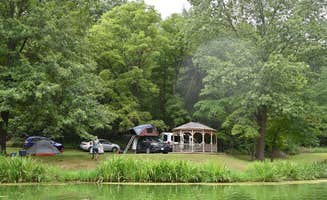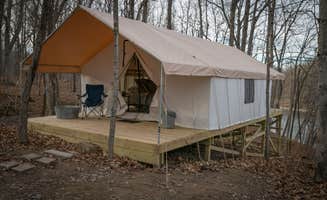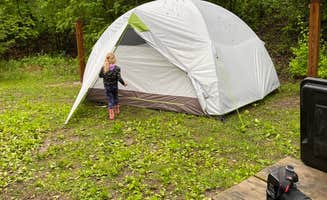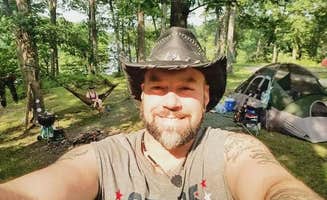Tent campsites near Alton, Illinois sit along the Mississippi River valley where the terrain transitions from forested bluffs to riverside flatlands. The region typically sees mild spring and fall camping seasons with summer temperatures averaging 85-90°F and high humidity. Camping opportunities cluster both north and west of Alton, with sites ranging from $10-23 per night depending on amenities and location.
What to do
Fishing access: At McCully Heritage Project in Kampsville, campers can enjoy fishing at the pond with convenient bridge access. "A friend discovered this gem a while back and we now frequent it. Super inexpensive for the space that you get. Free firewood. We have only stayed at the largest site as it has good fishing and a place for us to launch our paddleboards and kayaks," writes Eric.
Biking the Katy Trail: Tent camping areas near St. Charles County Klondike Park provide direct access to the Katy Trail. "I have bike-packed along the Katy and this is an excellent spot for an overnight(s) stay. It is a tough, but short, climb from the trail. You may have to walk up the hill - challenge made :-)," notes Mike L. The trail connects multiple camping areas for multi-day cycling trips.
Wine country exploration: Several campgrounds place you near Missouri wine country. "This Campground places you in the heart of Missouri Wine Country and there's a perfect base for visiting the wineries and restaurants along highway 94," explains Marty C. about St. Charles County Klondike Park. Most wineries open 11am-5pm daily with tastings ranging from $5-15.
What campers like
Affordable pricing: Budget-conscious campers appreciate the low costs at tent sites near Alton. "Super inexpensive for the space that you get. Free firewood," mentions Eric about McCully Heritage Project, where camping runs just $10 per night. Other campsites maintain similar affordability with most basic sites under $15.
Varied terrain: William R. Logan Conservation Area offers campers diverse landscapes within one property. "Plenty of tent spots with tree cover and fire pits. Lighting bugs came out at night," reports Kelly C. The conservation area includes multiple lakes, wooded areas, and open fields for camping.
Privacy options: Many campgrounds offer a mix of secluded and social sites. "There is a lollipop loop with some really primitive and obviously rarely used campsites in the woods behind the main camp area," notes Annie C. about William R. Logan Conservation Area. Most tent-only areas provide more seclusion than mixed-use campgrounds.
What you should know
Reservation requirements: Some campgrounds require advance booking. At Waverly Lake City Park, "There's also a 4 consecutive day per month limit," advises John H. Check individual campground websites as reservation windows range from same-day to 6 months in advance.
Wildlife encounters: Multiple campers report active wildlife, particularly after dark. "Be mindful of field roaches and raccoons at night, as we had to learn the hard way the morning after our first night. Oh, and the mosquitoes are BRUTAL. Come prepared," warns Darren D. about Waverly Lake City Park. Similar reports come from other campgrounds.
Water availability varies: Not all campsites provide drinking water. "As far as I know there's no running water. There are portable toilets that are kept clean," notes John H. about Waverly Lake. Campers should bring their own water supply or confirm availability before arrival.
Tips for camping with families
Playground access: Some camping areas include play equipment for children. At McCully Heritage Project, "We had a picnic and the kids got to play on the playground equipment," shares Leo S. The play areas provide entertainment options between hiking and water activities.
Short trail options: Dr. Edmund A. Babler Memorial State Park offers family-friendly hiking. "The park has a lot to offer. The trails are not too long but can be challenging for small kids or folks that are not used to hiking," explains Scott M. Trail maps showing distance and difficulty are available at park offices.
Safety considerations: Parents note the campgrounds feel secure. "This is truly a hidden gem. Tucked away, not far from St. Louis, you wouldn't know you were that close to a big city. It is clean and feels extremely safe," remarks Lahree C. about Dr. Edmund A. Babler Memorial State Park. Rangers patrol most established campgrounds regularly.
Tips from RVers
Site selection guidance: At Klondike Park, RVers should be strategic about site selection. "Second time camping here. Much better spot this time, since I could pull right up to the spot, site 26. Last time we were in spot 22. 22 is a long ways from the bathroom and parking lot," advises Sam B. Site maps with distances to facilities are available online.
Length restrictions: RV campers should verify size limitations before booking. "Not all sites are long enough for large RVs and the roads in some loops prevent you from turning around. The camp hosts we encountered are very helpful and have a list of site lengths and can tell you which ones are appropriate for large RVs," notes Nancy W. Most tent-focused campgrounds accommodate smaller RVs under 25 feet better than larger rigs.
Seasonal facility changes: Winter camping means reduced amenities. "Not having water available except at the camp host, and no open restrooms and showers until after April 1, regardless of when the last freeze is was inconvenient for a spring break trip," shares Archie S. about Dr. Edmund A. Babler Memorial State Park. Call ahead to confirm winterized facility status.





